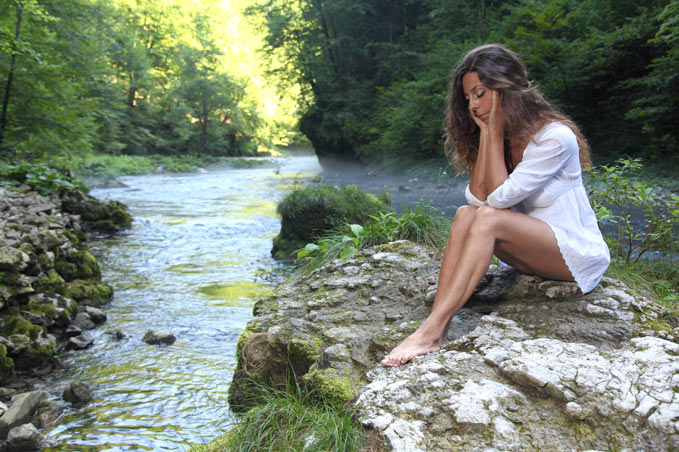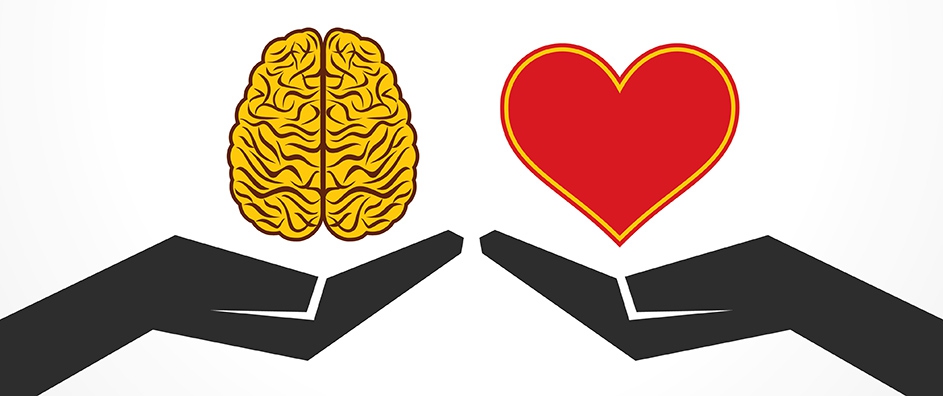The views expressed in our content reflect individual perspectives and do not represent the authoritative views of the Baha'i Faith.
I have two very important pieces of advice for those who’ve suffered through trauma like me—find a good counselor who can help you work through the post-traumatic stress disorder you undoubtedly have; and turn toward God and your higher, more spiritual inner nature.
It took me a long time, and the help of those two very important factors, to wade through my misconceptions about my own emotions, and to think about them a bit differently. For example: growing up, my unconscious belief, however erroneously, was that anger = bad emotion and happy = good.
 My counselor asked me to instead think of my emotions as a continuously flowing river within me, there permanently like my heart, lungs, veins, etc. That river of emotions, he said, isn’t good or bad, but should be seen as an indicator for a state of being–which then requires a particular action or set of actions.
My counselor asked me to instead think of my emotions as a continuously flowing river within me, there permanently like my heart, lungs, veins, etc. That river of emotions, he said, isn’t good or bad, but should be seen as an indicator for a state of being–which then requires a particular action or set of actions.
I have come to view this river of emotion as a stream within my consciousness. So when something from an external or internal source stimulates that stream, particular emotions become filled with current, driving the flow of the stream into a particular part of my brain or autonomic nervous system–which then kindles processes providing me with information about what to do with that stimulus.
For the most part, this process can help us contemplate the emotion we’ve just been flooded with. In other words, we can step back and more fully engage our rational faculty, that which distinguishes us from animals and identifies us as human. This faculty gives us an ability to determine which emotion it is, and whether its source represents our higher or lower nature. Meditating on and reflectively contemplating our emotions gives us the ability to decide if we want to express that feeling–or combat it with a different emotion. Abdu’l-Baha explains:
…this human reality stands between the higher and the lower in man, between the world of the animal and the world of divinity. When the animal proclivity in man becomes predominant, he sinks even lower than the brute…In him there is antagonism, hatred and selfish struggle for existence; in his nature lurk jealousy, revenge, ferocity, cunning, hypocrisy, greed, injustice and tyranny…
On the other hand, we find in him justice, sincerity, faithfulness, knowledge, wisdom, illumination, mercy and pity coupled with intellect, comprehension, the power to grasp the realities of things and the ability to penetrate the truths of existence. All these great perfections are to be found in man. Therefore we say that man is a reality which stands between light and darkness. From this standpoint of view, his nature is threefold, animal, human and divine. The animal nature is darkness; the heavenly is light in light. – Abdu’l-Baha, Foundations of World Unity, p. 110
Thinking of emotion as stemming from our higher and lower natures was an enlightening moment for me, because I could then see the reason for emotion more clearly.
I’ve learned that emotion can serve as a tool to facilitate self-understanding and communication. It can also provide a means to train my own inner faculties on how to become a more advanced, evolved human being, which gives me a way to fine-tune my own character. Emotion provides a sort of self-contained feedback loop, from heart to soul to mind, that allows me to better know the things that lead to my own growth or to my own pain and suffering:
Just as the earth attracts everything to the centre of gravity and every object thrown upward into space will come down; so also material ideas and worldly thoughts attract man to the centre of self. Anger, passion, ignorance, prejudice, greed, envy, covetousness, jealousy and suspicion prevent man from ascending to the Realms of Holiness, imprisoning him in the claws of self and the jail of egotism. – Abdu’l-Baha, Star of the West, Volume 6, p. 126.
So when my anger is triggered I am capable of implementing my rational faculty to introduce thoughts of peace–which facilitates bringing calming emotion to extinguish my anger, instead of acting out anger in harmful ways. As the Baha’i teachings suggest, I can then try to oppose thoughts of hatred with the stronger force of love:
I charge you all that each one of you concentrate all the thoughts of your heart on love and unity. When a thought of war comes, oppose it by a stronger thought of peace. A thought of hatred must be destroyed by a more powerful thought of love. Thoughts of war bring destruction to all harmony, well-being, restfulness and content. Thoughts of love are constructive of brotherhood, peace, friendship, and happiness. – Abdu’l-Baha, Paris Talks, p. 31.
It has been hard work to delve into the messiness of my mind, confront my post-traumatic stress and untangle my emotions. I am grateful that I’ve had the chance to do so. My body and mind are healing. Pain levels are abating and fatigue, although still an issue, is no longer completely debilitating.
I find identifying the different emotions flowing from my consciousness has become easier, as has differentiating them. The capacity to engage my rational faculty increases as I become more adept at utilizing it in transcending my lower nature, and as I aspire to further develop my spiritual nature.
I’m getting lots of opportunity to practice.
















Comments
Sign in or create an account
Continue with Googleor